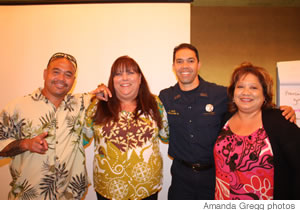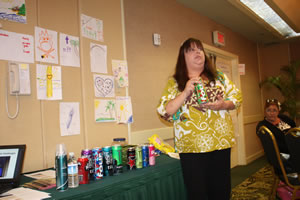Our Underage Drinking Problem
Community leaders are taking advantage of free training to combat teen alcohol abuseKaua’i, like many places has an under-age drinking problem.
Theresa Koki wants to do something about it. Koki is the county anti-drug coordinator, and her grant-funded team of about 40 are doing all they can to change attitudes and behavior.
During the week of March 14, Koki helped lead a Substance Abuse Prevention Specialist Training, which was offered free at the Kauai Beach Resort thanks to funding through a Strategic Prevention Framework Incentive Grant – which the county received from the Substance Abuse Mental Health
Services Administration through the state’s Department of Health, Alcohol Drug Abuse Division. Those attending included members of the Kauai Fire Department, members of the county’s drug-treatment and prevention committees and people from faith-based substance-abuse recovery programs, as well as therapists and Drug Court employees.
Koki, who as part of the grant has been working to further educate the community on drinking by youths ages 12-17, says sometimes even grocery store employees aren’t aware certain products have alcohol in them, such as Four Loko and Tilt (alcoholic beverages with caffeine packaged in brightly colored, shiny cans, just the type to attract children).
“I said, ‘Sister, why you have the alcohol next to the juice?'” Koki says of confronting the employee. “She didn’t know it had alcohol in it.”
Koki placed the two cans in a lineup among juices and alcohol-free energy drinks such as Monster to demonstrate to training attendees just how similar in look the packaging of non-alcoholic and alcoholic beverages are.
Koki then moved on to Whipahol, a form of whipped cream in a can that is 30 proof.
“We call this ‘death in a can,'” she says, holding it up. “Kids are getting alcohol poisoning already. … and now they’re inhaling this or topping it on other alcoholic drinks.”
As homework during the training, participants were asked to pay attention to the marketing of alcohol and anti-drug campaigns. Each brought in an example, some that clearly seemed to target youths.
Mardi Maione of Addiction and Behavioral Health Services brought in a People magazine recipe for the “Bieber-tini” (yes, as in tween icon Justin Bieber). Though the recipe included a “virgin” version, it also called for an alcoholic mixture of Three Olives Bubble vodka and Pop Rocks, topped with a Blow Pop.
Ken Smith, prevention specialist and trainer who showed a video to the group claiming that children see more than 100,000 alcohol ads before they turn 18. He had the group study the overall pro-alcohol messages that bombard youth.
“Life’s a party when you drink, right?” Smith says of the message.
Demonstrating that it’s possible to take a child’s propensity toward rebellion and have youths rebel against the people selling an addictive lifestyle, Smith’s video pointed out that youths enjoy ads that are “funny” and “with animals” – much like the Budweiser frogs and Joe Camel.

Seminar participants included (from left) Tommy Tokioka, Theresa Koki, Dodd Apao and Kimberly Cummings
“In each grant there is an ethics clause we have to live by so if we’re prevention specialists, it’s cut and dry,” Koki said of living a drug-free life.
Smith added that a lot of times it’s not about the law (e.g., selling to minors is illegal, as is buying alcohol for a minor, but it still happens). It’s whether the law is enforced.
Koki says it was with that in mind that the county mirrored a Florida law, which has resulted in the arrests of dozens of servers and liquor store employees who have sold to minors. Rather than issuing a ticket or fine, taking them into custody in a police car has made an impact.
What also has made an impact is that the arrests lead to the violator’s name being put in the blotter and subsequently published.
“Kaua’i is so small,” Koki says. “It’s going to be a friend or oftentimes a family member who is supplying the alcohol to a minor.”
There are areas of the law that are still circumvented in terms of minors getting alcohol, however. Koki uses the example of some female youths on the South Shore who have made it a practice to ask male visitors to buy the alcohol for them, or young males who pay the homeless an extra $20 for the same thing.
Raising questions is one of the first ways to create answers.
“We’ve got to try to have an impact, long-term,” says Smith.
Doing so includes considering the cultural context to prevention, he says, so it’s “not a surface solution.”
Brenda Jose, the county’s Community Mobilizing for Change on Alcohol coordinator (also funded by the SPFSIG) says ensuring educating the public to use that cultural context is key.
“We don’t want to shut people off and be down their throat,” she says, adding “every challenge I see is an opportunity for change.”
Jose also says she felt the training was a great opportunity to network with a lot of people.
“I never realized how hungry (those in prevention) are to learn from those in treatment, and how treatment can value prevention in some shape or form,” she says.
Jennifer Tone, senior probation officer, says even though most people she deals with are “already using,” she could apply the information offered at the training, including how to identify risk and protective factors that make people more likely to use.
“I can apply some of that (knowledge) for sure,” she says.
The next free training workshop is March 30 and 31 at Kaua’i Beach Resort, Orchid Room, from 8 am to 4:30 pm on both days. There is no charge to attend the workshop. Registration is limited to 35 participants with preference given to county and state employees and community partners. For more information, email tkoki@kauai.gov.
You must be logged in to post a comment.





There are no comments
Add yours